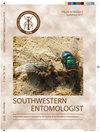Ethanolic Plant Extracts as Potential Biomiticides Against Oligonychus perseae (Acari: Tetranychidae) on Avocado in Mexico
IF 0.4
4区 农林科学
Q4 ENTOMOLOGY
引用次数: 0
Abstract
Abstract. Oligonychus perseae Tuttle, Baker & Abbatiello (Acari: Tetranychidae) is an economically important pest of avocado (Persea americana Mill.) in Mexico. Resistance reduced the efficacy of broad-spectrum miticides used to control this pest. Identification of reliable and more environmentally friendly alternatives is crucial for reduction of pesticide use in agriculture. This study determined the efficacy of three plant extracts derived from wild species, Petiveria alliacea L. (Phytolaccaceae), reseda luteola L. (Resedaceae), and Isocoma hartwegii (A. Gray) Greene (Asteraceae) for control of the mite. In vitro and field experiments were done. Ethanolic wild plant extracts from Petiveria alliacea and Isocoma hartwegii killed most mites by 24 hours after application in in-vitro assays. At field conditions, most effective extracts were from Petiveria alliacea and reseda luteola. Two commercial products derived from Azadirachta indica extract and combination of pepper + garlic extracts had good efficacy at in vitro and field conditions.植物乙醇提取物对墨西哥鳄梨上的波斯少爪螨(叶螨科)有潜在的生物杀灭作用
摘要墨西哥鳄梨(Persea americana Mill.)是墨西哥鳄梨(Persea americana Mill.)的重要害虫。抗性降低了用于控制这种害虫的广谱杀虫剂的效果。确定可靠和更环保的替代品对于减少农业中农药的使用至关重要。本研究测定了三种野生植物的提取物——韭葱(Petiveria alliacea L.)、木犀草(reseda luteola L.)和紫菀科(Isocoma hartwegii (A. Gray) Greene (Asteraceae)的防螨效果。进行了体外和田间实验。在体外试验中,用野生植物葱柄草(Petiveria alliacea)和hartwegii的乙醇提取物在施用后24小时内杀灭大部分螨虫。在田间条件下,最有效的提取物为韭菜和木犀草。印楝提取物和辣椒+大蒜提取物组合在离体和田间条件下均具有良好的抑菌效果。
本文章由计算机程序翻译,如有差异,请以英文原文为准。
求助全文
约1分钟内获得全文
求助全文
来源期刊

Southwestern Entomologist
生物-昆虫学
CiteScore
0.60
自引率
25.00%
发文量
95
审稿时长
6-12 weeks
期刊介绍:
Manuscripts submitted for consideration for publication in the Southwestern Entomologist should report results of entomological research in the southwestern United States or Mexico or should report results of studies on entomological species, relevant to this region, which may be done elsewhere, provided such results are geographically applicable. Manuscripts that report results of routine laboratory or field experiments for which the primary purpose is gathering baseline data or those that report results of a continuous evaluation program such as preliminary pesticide evaluation experiments, species lists with no supporting biological data, or preliminary plant resistance evaluations are not acceptable. However, reports of experiments with insecticides, acaricides, and microbials are acceptable if they are comprehensive and include data related to economics, resistance, toxicology, or other broad subject areas. Bibliographies will not be published in Southwestern Entomologist.
 求助内容:
求助内容: 应助结果提醒方式:
应助结果提醒方式:


